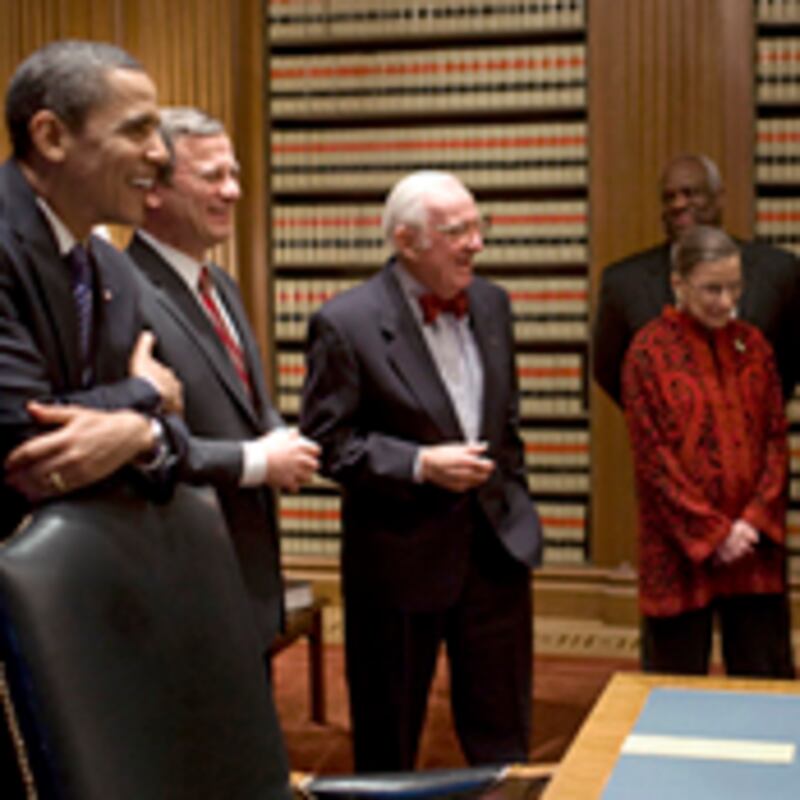
On Thursday, the announcement that Supreme Court Justice Ruth Bader Ginsburg had undergone surgery for pancreatic cancer launched immediate speculation of Obama’s coming Supreme Court picks. One of Washington’s favorite parlor games—name that nominee—is already in full swing. But it may be premature. The feisty Ginsburg, 75 years old, has repeatedly signaled her intention to remain on the court for as long as she can continue to perform her duties, and many close to her suggest that an early withdrawal is not in the cards.
But attention to the appointment process is still appropriate. Three justices are within range for retirement during the Obama presidency, almost certainly during this term: Ginsburg; John Paul Stevens, who, at 88 years old, is the court’s oldest justice; and David Souter, 69, who has regularly signaled his eagerness to retire and return to New Hampshire. Normally, a president would be pleased about the prospect of making three appointments to the court. But all three of the justices viewed as most likely to retire come from the court’s center-left minority. Moreover, in past years Supreme Court nominations have often triggered firestorms. Obama is expected to tap candidates with views compatible with those departing in terms of legal doctrine, so his appointments are unlikely to make much of a difference in the way the court does its business. At least that’s the conventional wisdom among scholars of the Supreme Court.
Nearly all observers expect Obama’s appointment to be a woman with solid experience either on the bench or in the Justice Department.
Yet it would be foolish to discount Obama’s ability to transform the court even over a four-year presidency. As a two-term president, he could have a longer lasting impact. A number of names have been put into play already, based on the assumption that Ginsburg will be the first to tender her resignation. Nearly all observers expect Obama’s appointment to be a woman with solid experience either on the bench or in the Justice Department. Harvard Law School Dean Elena Kagan, federal Circuit Court judges Sonia Sotomayor and Diane Wood, and law professor Kathleen M. Sullivan figure among the names most frequently cited. Kagan has just been named Solicitor General. In the current political environment, Obama may even offer some surprises as part of his effort to break the political logjam in Washington.
On the campaign trail, Obama was asked repeatedly what kind of judges he expected to appoint to the bench. His answers were carefully framed to avoid committing too much, but they were revealing. He would not focus on individuals based on their academic or judicial pedigree, he said, but would instead pay attention to how their views would affect ordinary Americans. While ambiguous, this comment may point to candidates different in timbre than the two Clinton-era justices, Ginsburg and Breyer—two liberal figures accepted by many on the right because of their disdain for judicial intervention.
Senator Orrin Hatch of Utah, then the leading Republican voice on the Judiciary Committee, claimed a measure of credit for both Clinton picks. Hatch pushed for justices from the “mainstream” rather than “doctrinaire liberals.” One of the issues facing Obama, who has recently touted his intention to govern from the center and reach out to Republicans, will be whether to follow the Clinton precedent—advocated by moderate Democrats like John Podesta (later Clinton’s chief of staff and now president of the Center for American Progress)—and allow leading Senate Judiciary Republicans to help shape his choices.
But a number of factors could weigh against such an approach. First, the Bush administration did not reciprocate by allowing Democrats influence in its Supreme Court picks, even when Democrats were in the majority. Bush picked John Roberts and Samuel Alito, candidates with a strong conservative-movement orientation. Notwithstanding Clinton’s highly conciliatory approach, Republicans blocked approval of far more Clinton nominees to the federal bench than Democrats blocked approval of Bush nominees.
Second, public opinion now views the Supreme Court in particular and the federal bench in general as having drifted too far to the right. Polling also suggests that the public are tired of the hot-button issues associated with prior Supreme Court picks (abortion and gay rights)—issues which in fact only very rarely figure on the Supreme Court’s calendar. Instead, public concern that the courts are failing to uphold “basic constitutional values” has soared to the front position. This concern may be linked to many issues, but most reflect a sense that the unilateral power of the presidency has grown at the cost of civil rights and liberties. The public today wants to see nominees who will be more protective of the rights of individuals than the two George W. Bush-era nominees.
A review of Obama’s picks for legal-policy posts reveals some recurring themes. Whereas the Bush administration put a premium on political fidelity in appointees, looking for membership in the Federalist Society, time spent in the trenches in political campaigns, and campaign contributions, the Obama selections seem largely culled on the basis of their intellectual firepower. Obama, a part-time law-school professor at the University of Chicago, puts a lot of emphasis on finding candidates who are bright and well-grounded in legal policy issues. Many have an academic background, but he is especially interested in academics with some measure of engagement in social issues. Many are liberals, but Obama has an affinity for articulate, clever and moderate conservatives as well. Sooner rather than later, he can be expected to show his hand.
Scott Horton is a law professor and writer on legal and national-security affairs for Harper's Magazine and The American Lawyer, among other publications.





